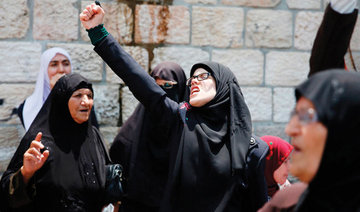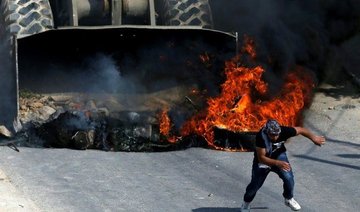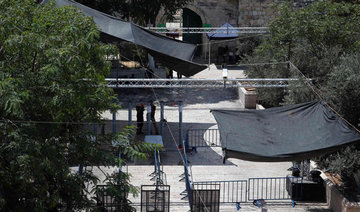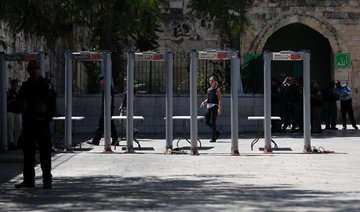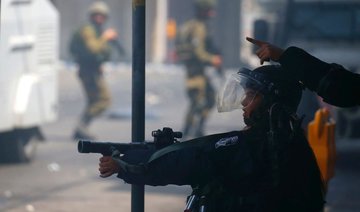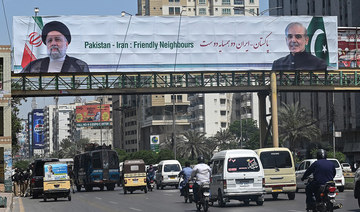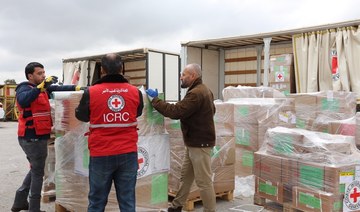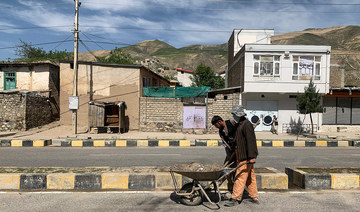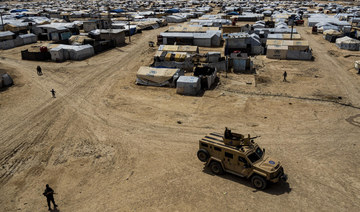JERUSALEM: Israel began Tuesday to dismantle metal detectors it installed a week earlier at a contested Jerusalem shrine, hoping to defuse a crisis with the Muslim world, including security ally Jordan, the Muslim custodian of the holy site.
The removal of the devices followed the resolution of a 24-hour diplomatic standoff with Jordan over a deadly shooting at the Israeli Embassy in the kingdom, suggesting a broader deal had been struck.
Israeli Embassy staff, including the security guard who had killed two Jordanians after being attacked by one with a screwdriver, returned to Israel from their base in Jordan overnight.
Jordan initially said the guard could not leave without an investigation, while Israel said he had diplomatic immunity.
Israeli Prime Minister Benjamin Netanyahu and Jordan’s King Abdullah II spoke by phone late Monday to discuss the crises, including the tensions over the 37-acre (15-hectare) sacred esplanade in Jerusalem’s Old City. The walled compound is third holiest site of Islam and the holiest of Judaism, once home to biblical Temples.
The apparent deal came amid intensifying US diplomatic efforts, with President Donald Trump’s Mideast envoy, Jason Greenblatt, meeting with Netanyahu in Jerusalem on Monday.
Israel had erected metal detectors at the gates to the Muslim-administered site earlier this month, after Arab gunmen killed two Israeli police guards there.
The move incensed the Muslim world, amid allegations that Israel was trying to expand control over the site under the guise of security. The installation of the metal detectors set off mass prayer protests and deadly Israeli-Palestinian violence over the past week.
Israel has denied it has a hidden agenda, portraying the metal detectors as a needed means to prevent attacks.
Early Tuesday, Israel’s security Cabinet decided to replace the metal detectors with “advanced technologies,” reportedly cameras that can detect hidden objects. The Cabinet said police would increase deployment until the new measures are in place.
The statement said the changes would be implemented over a period of “up to six months.”
Before dawn Tuesday, workers were seen dismantling one of the devices at the Old City’s Lion’s Gate, a recent flashpoint and a scene of nightly mass prayer protests by Muslim worshippers.
It was not clear if the compromise would be accepted by Muslim and Palestinian leaders who had demanded a return to the security arrangements that were in place before the mid-July shooting attack.
Mahmoud Aloul, a senior official in Palestinian President Mahmoud Abbas’ Fatah movement, said Tuesday that any changes to the previous arrangements are unacceptable.
“Israel is an occupying power and needs to take its hands from our holy sites,” he told the Voice of Palestine radio station.
It was not clear if Aloul expressed the views of Abbas. The Palestinian president had announced last week that he was suspending all ties with Israel, including security coordination between his forces and Israeli troops in the West Bank, until the metal detectors are removed.
As custodian, Jordan has the final say over Muslim policies at the shrine, but also needs to consider public opinion, including among Palestinians in the Holy Land.
In his phone call with Netanyahu, Jordan’s king stressed the need to “remove the measures taken by the Israeli side since the recent crisis broke out” and to agree on steps that would prevent another escalation in the future, Jordan’s state news agency Petra said.
The fate of the shrine is an emotional issue at the heart of the conflict between Israel and the Palestinians.
Israel captured the Old City compound, along with other territories sought for a Palestinian state, in the 1967 war. Under arrangements put in place then, Muslims administer the site and Jews can visit, but not pray there.
Israel’s decision to remove the metal detectors came just after Israel and Jordan resolved their standoff over Sunday’s shooting at the Israeli Embassy in the kingdom.
Embassy staff was evacuated to Israel late Monday.
Meanwhile, Jordan’s Public Security Directorate said it had concluded an investigation of the incident, portraying it as a verbal spat that turned violent.
The security agency said the incident began when two Jordanians arrived at a residential building housing embassy staff to set up bedroom furniture. It said one of the Jordanians was the son of the owner the furniture store, later identified as 17-year-old Mohammed Jawawdeh.
It said an argument erupted between the son of the owner and the embassy guard because of a delay in delivering the furniture.
The argument took place in the presence of the landlord and a doorman, the agency said.
“The son of the owner attacked the Israeli diplomat and injured him,” the statement said. It said the Israeli fired toward the teen, wounding him, and also struck the landlord who was standing nearby.
The two Jordanians died of their wounds at a hospital.
Earlier Monday, Al-Jawawdeh’s father, Zakariah, had called for an investigation, saying his son deserves justice. It was not clear if the findings of the security agency will satisfy him.
Israel dismantles metal detectors from key Jerusalem shrine
Israel dismantles metal detectors from key Jerusalem shrine
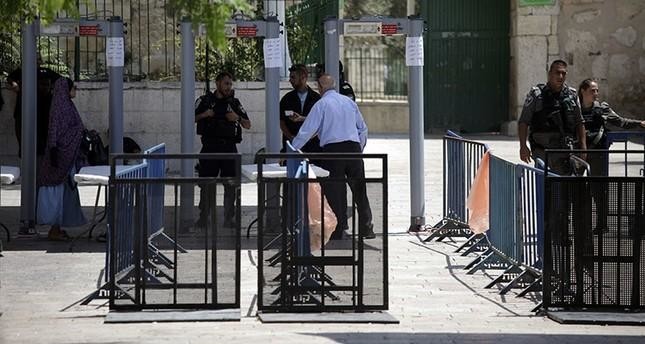
UN chief calls for ‘immediate’ Gaza ceasefire, hostage release

- UN chief: ‘The war in Gaza is causing horrific human suffering, devastating lives, tearing families apart and rendering huge numbers of people homeless, hungry and traumatized’
KUWAIT CITY: UN Secretary-General Antonio Guterres on Sunday urged an immediate halt to the Israel-Hamas war in Gaza, the return of hostages and a “surge” in humanitarian aid to the besieged Palestinian territory.
“I repeat my call, the world’s call for an immediate humanitarian ceasefire, the unconditional release of all hostages and an immediate surge in humanitarian aid,” Guterres said in a video address to an international donors’ conference in Kuwait.
“But a ceasefire will only be the start. It will be a long road back from the devastation and trauma of this war,” he added.
Israeli strikes on Gaza continued on Sunday after it expanded an evacuation order for Rafah despite international outcry over its military incursion into eastern areas of the city, effectively shutting a key aid crossing.
“The war in Gaza is causing horrific human suffering, devastating lives, tearing families apart and rendering huge numbers of people homeless, hungry and traumatized,” Guterres said.
His remarks were played at the opening of the conference in Kuwait organized by the International Islamic Charitable Organization (IICO) and the UN’s humanitarian coordination organization OCHA.
On Friday, in Nairobi, the UN head warned Gaza faced an “epic humanitarian disaster” if Israel launched a full-scale ground operation in Rafah.
Gaza’s bloodiest-ever war began following Hamas’s unprecedented October 7 attack on Israel that resulted in the deaths of more than 1,170 people, mostly civilians, according to an AFP tally of Israeli official figures.
Vowing to destroy Hamas, Israel launched a retaliatory offensive that has killed more than 34,971 people in Gaza, mostly women and children, according to the Hamas-run territory’s health ministry.
Iran conservatives tighten grip in parliament vote

- Elected members are to choose a speaker for the 290-seat parliament when they begin their work on May 27
- Conservatives won the majority of the 45 remaining seats up for grabs in the vote held in 15 of 31 provinces: local media
TEHRAN: Iran’s conservatives and ultra-conservatives clinched more seats in a partial rerun of the country’s parliamentary elections, official results showed Saturday, tightening their hold on the chamber.
Voters had been called to cast ballots again on Friday in regions where candidates failed to gain enough votes in the March 1 election, which saw the lowest turnout — 41 percent — since the 1979 Islamic Revolution.
Candidates categorized as conservative or ultra-conservative on pre-election lists won the majority of the 45 remaining seats up for grabs in the vote held in 15 of Iran’s 31 provinces, according to local media.
For the first time in the country, voting on Friday was a completely electronic process at eight of the 22 constituencies in Tehran and the cities of Tabriz in the northwest and Shiraz in the south, state TV said.
“Usually, the participation in the second round is less than the first round,” Interior Minister Ahmad Vahidi told reporters in Tehran, without specifying what the turnout was in the latest round.
“Contrary to some predictions, all the candidates had a relatively acceptable and good number of votes,” he added.
Elected members are to choose a speaker for the 290-seat parliament when they begin their work on May 27.
In March, 25 million Iranians took part in the election out of 61 million eligible voters.
The main coalition of reform parties, the Reform Front, had said ahead of the first round that it would not participate in “meaningless, non-competitive and ineffective elections.”
The vote was the first since nationwide protests broke out following the September 2022 death in custody of Mahsa Amini, a 22-year-old Iranian Kurd, arrested for allegedly breaching the Islamic republic’s strict dress code for women.
In the 2016 parliamentary elections, first-round turnout was above 61 percent, before falling to 42.57 percent in 2020 when elections took place during the Covid pandemic.
UN reports fighting in Sudan’s Darfur involving ‘heavy weaponry’

- The United States last month warned of a looming rebel military offensive on the city, a humanitarian hub that appears to be at the center of a newly opening front in the country’s civil war
PORT SUDAN: A major city in Sudan’s western region of Darfur has been rocked by fighting involving “heavy weaponry,” a senior UN official said Saturday.
Violence erupted in populated areas of El-Fasher, putting about 800,000 people at risk, Clementine Nkweta-Salami, the UN’s humanitarian coordinator for Sudan, said in a statement.
Wounded civilians were being rushed to hospital and civilians were trying to flee the fighting, she added.
“I am gravely concerned by the eruption of clashes in (El-Fasher) despite repeated calls to parties to the conflict to refrain from attacking the city,” said Nkweta-Salami.
“I am equally disturbed by reports of the use of heavy weaponry and attacks in highly populated areas in the city center and the outskirts of (El-Fasher), resulting in multiple casualties,” she added.
For more than a year, Sudan has suffered a war between the army, headed by the country’s de facto leader Abdel Fattah Al-Burhan, and the paramilitary Rapid Support Forces (RSF), commanded by his former deputy Mohamed Hamdan Dagalo.
The war has killed tens of thousands of people and forced more than 8.5 million to flee their homes in what the United Nations has called the “largest displacement crisis in the world.”
The RSF has seized four out of five state capitals in Darfur, a region about the size of France and home to around one quarter of Sudan’s 48 million people.
El-Fasher is the last major city in Darfur that is not under paramilitary control and the United States warned last month of a looming offensive on the city.
UN chief Antonio Guterres said Saturday he was “very concerned about the ongoing war in Sudan.”
“We need an urgent ceasefire and a coordinated international effort to deliver a political process that can get the country back on track,” he said in a post on social media site X.
Tunisian police arrest prominent lawyer critical of president

- Dozens of lawyers took to the streets in protest on Saturday night, carrying banners reading “Our profession will not kneel” and “We will continue the struggle” Saied came to power in free elections in 2019
TUNIS: Tunisian police stormed the building of the Deanship of Lawyers on Saturday and arrested Sonia Dahmani, a lawyer known for her fierce criticism of President Kais Saied, and then arrested two journalists who witnessed the confrontation, a journalists’ syndicate said.
Two IFM radio journalists, Mourad Zghidi and Borhen Bsaiss, were arrested, an official in the country’s main journalists’ syndicate told Reuters. The incident was the latest in a series of arrests and investigations targeting activists, journalists and civil society groups critical of Saied and the government. The move reinforces opponents’ fears of an increasingly authoritarian government ahead of presidential elections expected later this year.
Dahmani was arrested after she said on a television program this week that Tunisia is a country where life is not pleasant. She was commenting on a speech by Saied, who said there was a conspiracy to push thousands of undocumented migrants from Sub-Saharan countries to stay in Tunisia. Dahmani was called before a judge on Wednesday on suspicion of spreading rumors and attacking public security following her comments, but she asked for postponement of the investigation.
The judge rejected her request. Dozens of lawyers took to the streets in protest on Saturday night, carrying banners reading “Our profession will not kneel” and “We will continue the struggle” Saied came to power in free elections in 2019. Two years later he seized additional powers when he shut down the elected parliament and moved to rule by decree before assuming authority over the judiciary.
Since Tunisia’s 2011 revolution, the country has won more press freedoms and is considered one of the more open media environments in the Arab world. Politicians, journalists and unions, however, say that freedom of the press faces a serious threat under the rule of Saied. The president has rejected the accusations and said he will not become a dictator.
Syrian Kurdish force hands over 2 Daesh members suspected in 2014 mass killing of Iraqi troops

- Iraq has, over the past several years, put on trial and later executed dozens of Daesh members over their involvement in the Speicher massacre
BEIRUT: Syria’s US-backed Kurdish-led force has handed over to Baghdad two Daesh militants suspected of involvement in mass killings of Iraqi soldiers in 2014, a war monitor said.
The report by the Syrian Observatory for Human Rights came a day after the Iraqi National Intelligence Service said it had brought back to the country three Daesh members from outside Iraq. The intelligence service did not provide more details.
Daesh captured an estimated 1,700 Iraqi soldiers after seizing Saddam Hussein‘s hometown of Tikrit in 2014. The soldiers were trying to flee from nearby Camp Speicher, a former US base.
BACKGROUND
Daesh captured an estimated 1,700 Iraqi soldiers after seizing Saddam Hussein‘s hometown of Tikrit in 2014.
Shortly after taking Tikrit, Daesh posted graphic images of Daesh militants shooting and killing the soldiers.
Farhad Shami, a spokesman for the Kurdish-led Syrian Democratic Forces, said the US-backed force handed over two Daesh members to Iraq.
It was not immediately clear where Iraqi authorities brought the third suspect from.
The 2014 killings, known as the Speicher massacre, sparked outrage across Iraq and partially fueled the mobilization of militias in the fight against Daesh.
Iraq has, over the past several years, put on trial and later executed dozens of Daesh members over their involvement in the Speicher massacre.
The Observatory said the two Daesh members were among 20 captured recently in a joint operation with the US-led coalition in the northern Syrian city of Raqqa, once the capital of Daesh’s self-declared caliphate.
Despite their defeat in Iraq in 2017 and in Syria in March 2019, the extremist sleeper cells are still active and have been carrying out deadly attacks against SDF and Syrian government forces.
Shami said a car rigged with explosives and driven by a suicide attacker tried on Friday night to storm a military checkpoint for the Deir El-Zour Military Council. This Arab majority faction is part of the SDF in the eastern Syrian village of Shuheil.
Shami said that when the guards tried to stop the car, the attacker blew himself up, killing three US-backed fighters.
No one immediately claimed responsibility for the attack, but it was similar to previous explosions carried out by IS militants.
The SDF is holding over 10,000 captured Daesh fighters in around two dozen detention facilities, including 2,000 foreigners whose home countries have refused to repatriate them.


